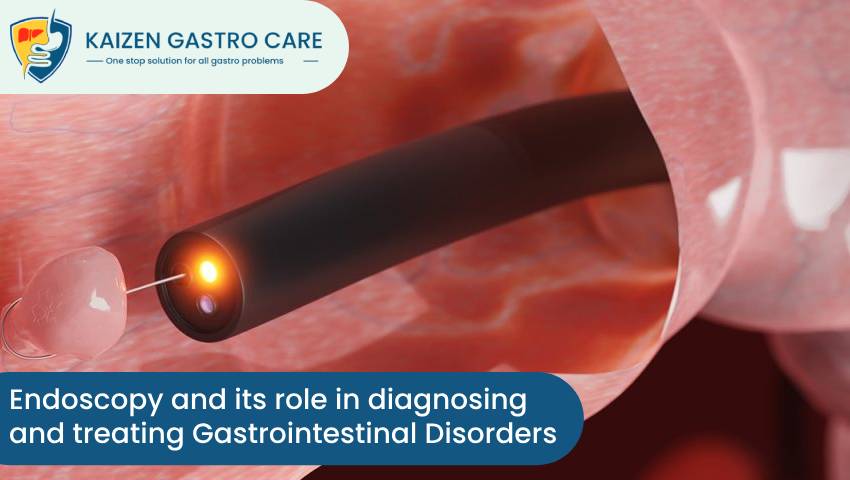
- 26/04/2024
- Kaizen Gastro Care
- 0 Comments
- Digestive Disorder
Endoscopy and its role in diagnosing and treating Gastrointestinal Disorders
Our digestive system, a complex network of organs, is responsible for breaking down food and absorbing nutrients. But sometimes, things go wrong. Abdominal pain, bloating, and changes in bowel habits can indicate a gastrointestinal (GI) disease. Endoscopy is a powerful tool that gastroenterologists use to diagnose and treat these gastrointestinal (GI) disorders.
At Kaizen Gastro Care Clinic, we prioritize patient-centric care and our team of experienced gastroenterologists and interventional endoscopists in Pune, Dr. Vikrant Kale, utilizes state-of-the-art endoscopic equipment and adheres to stringent safety protocols to provide optimal results for every patient. From comprehensive diagnostic evaluations to cutting-edge therapeutic interventions, we are committed to empowering our patients with the knowledge and resources needed to navigate their GI health journey with confidence.
What is Endoscopy?
Endoscopy is a minimally invasive technique that allows physicians to examine the inner lining of your digestive tract. It uses a thin, flexible tube called an endoscope equipped with a light source and a camera. The endoscope is inserted through a natural opening, like your mouth or rectum, depending on the area being examined. The camera transmits real-time pictures of your digestive tract onto a monitor, allowing the doctor to view abnormalities instantly.
Different types of endoscopes are used to examine different parts of the digestive system:
- Upper endoscopy (EGD): Examines the esophagus, stomach, and duodenum (first part of the small intestine).
- Colonoscopy: Examines the colon and rectum.
- Capsule endoscopy: Uses a tiny pill-sized camera that you swallow to take pictures of your small intestine.
- Endoscopic retrograde cholangiopancreatography (ERCP): Inserting an endoscope through the mouth to examine the bile ducts and pancreas. ERCP is used to diagnose and treat disorders such as gallstones, pancreatic cancer, and bile duct obstruction.
Diagnosing Digestive Disorders:
Endoscopy plays a crucial role in diagnosing a wide range of gastrointestinal (GI) conditions. By directly visualizing the lining of your digestive tract, doctors can identify:
- Ulcers: These painful sores can develop in the stomach or duodenum
- Inflammatory bowel disease (IBD): Chronic inflammation of the digestive tract, such as Crohn’s disease and ulcerative colitis which endoscopy can readily detect.
- Celiac disease: An immune reaction to gluten that harms the small intestine.
- Blockages: Endoscopy can help identify blockages caused by tumors or scar tissue.
- Polyps: These are abnormal growths of tissue that can be precancerous. Endoscopy allows for their removal during the procedure itself, potentially preventing colon cancer.
- Cancers: Early detection of GI cancers is important for successful treatment.
- Bleeding: Endoscopy can help identify the source of bleeding in the digestive tract.
- Tumors: Endoscopy can help determine both cancerous and benign tumors.
Treating Digestive Issues:
Endoscopy isn’t just a diagnostic tool; it can also be used for certain treatments. During an endoscopic procedure, Dr. Vikrant Kale can:
- Remove polyps: This can help prevent colon cancer.
- Stop bleeding: Methods like clipping or injection can be used to control bleeding ulcers.
- Open narrowed areas: Balloon dilation can enlarge a narrowed esophagus or other digestive tract passage.
- Stricture dilation: Narrowed areas of the digestive tract can be widened using balloons or stents inserted through the endoscope.
- Biopsy: During endoscopy, doctors can collect tissue samples (biopsies) for further analysis to confirm diagnoses.
- Foreign object removal: In some cases, swallowed objects can be retrieved via the endoscope.
Benefits of Endoscopy:
Compared to traditional surgery, endoscopy offers several advantages:
- Minimally invasive: Less risk of complications and faster recovery time.
- Direct visualization: Provides a clear view of the digestive tract for proper diagnosis.
- Treatment options: Can often treat certain conditions during the same procedure.
- Faster recovery time: Patients generally recover quickly and can restart normal activities within a day or two.
- Outpatient Procedure: Most endoscopic techniques can be performed on an outpatient basis, minimizing hospital stays and costs.
- Early Detection: Endoscopy allows the early detection of gastrointestinal disorders, improving treatment outcomes and prognosis.
Endoscopy is a safe and effective way for gastroenterologists to diagnose and treat a variety of digestive disorders. If you’re experiencing ongoing GI problems, consult Kaizen Gastro Care Clinic, expert interventional endoscopist Dr. Vikrant Kale, about whether an endoscopy might be right for you. Early diagnosis and treatment can significantly improve your gut health and overall well-being.
